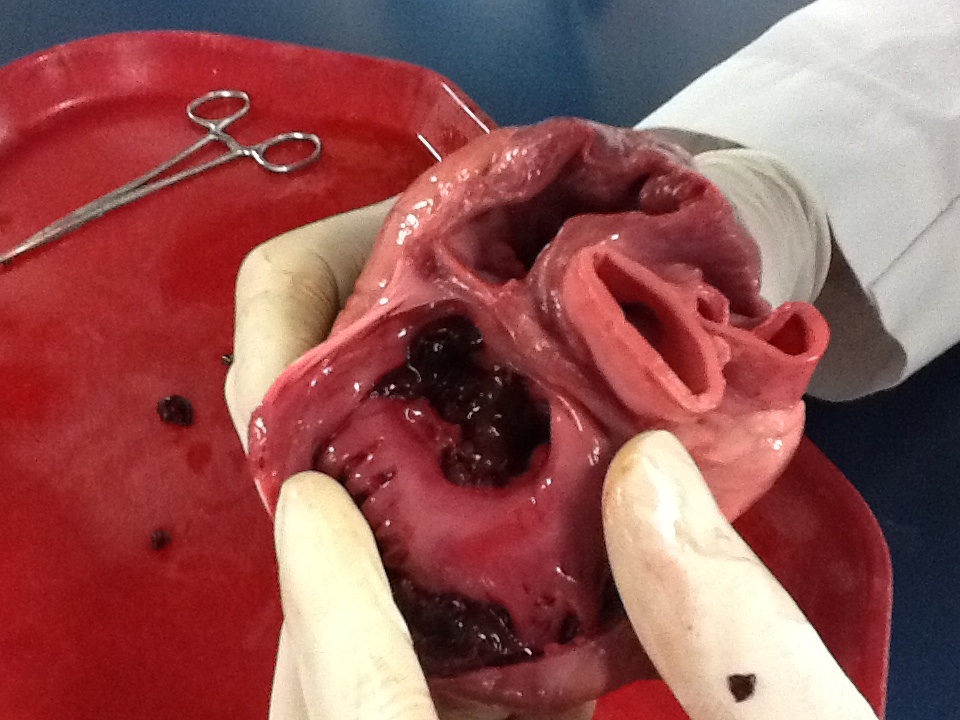Mitral regurgitation (⇐for video click on the link) also known as Mitral valve regurgitation/Mitral Insufficiency and Mitral incompetence, is a type of heart valve disease in which the valve between the left heart chambers doesn’t close completely, allowing blood to leak backward across the valve. It is the most common type of heart valve disease (valvular heart disease). If the leakage is severe, not enough blood will move through the heart or to the rest of the body. As a result, mitral valve regurgitation can make a person feel very tired (fatigued) and/or short of breath.
Thank you for reading this post, don't forget to subscribe!Severe mitral valve regurgitation often requires a catheter procedure or heart surgery to repair or replace the mitral valve. Without proper (especially Homeopathic) treatment, severe mitral valve regurgitation can cause heart rhythm problems (arrhythmias) or heart failure.
Symptoms
Mitral regurgitation is often mild and progresses slowly. Some people with mitral valve regurgitation might not have symptoms for many years.
But sometimes, mitral valve regurgitation develops quickly. This condition, called acute mitral valve regurgitation, causes sudden signs and symptoms.
Fatigue is a common but nonspecific symptom of mitral valve regurgitation. Other signs and symptoms of mitral valve regurgitation include:
- Sound of blood flow across the valve (heart murmur)
- Irregular heartbeat (arrhythmia)
- Shortness of breath (dyspnea), especially when lying down
- Sensation of a rapid, pounding or fluttering heartbeat (palpitations)
- Swollen feet or ankles (edema)
From Al-Haytham clinic (Dixecosmetics.com) to your inbox
Sign up/Subscribe for free, and stay up to date on research advancements, health tips and current health topics.
Causes
The mitral valve is one of four valves in the heart that keep blood flowing in the right direction (watch video). Each valve has flaps (leaflets) that open and close once during each heartbeat. If a valve doesn’t open or close properly, blood flow through the heart to the body can be reduced.
In mitral valve regurgitation, the valve flaps don’t close tightly. Blood leaks backward when the valve is closed, making it harder for the heart to work properly.
If mitral valve regurgitation is due to problems with the mitral valve, the condition is called primary mitral valve regurgitation.
If a problem or disease affecting other areas of the heart cause a leaky mitral valve, the condition is called functional or secondary mitral regurgitation.
Possible causes of mitral regurgitation include:
- Mitral valve prolapse. In this condition, the mitral valves flaps bulge back into the left upper heart chamber (atrium) when the heart squeezes (contracts). This common heart problem can prevent the mitral valve from closing tightly and cause blood to flow backward.
- Rheumatic fever. Rheumatic fever is a complication of untreated streptococcus throat infection. Rheumatic fever can damage the mitral valve, leading to mitral valve regurgitation early or later in life. If rheumatic fever causes mitral valve disease, the condition is called rheumatic mitral valve disease.
- Heart attack. A heart attack can damage the area of the heart muscle that supports the mitral valve. If heart attack damage is very extensive, the event can cause sudden and severe mitral valve regurgitation. A leaky mitral valve caused by a heart attack is called ischemic mitral regurgitation.
- Heart problem present at birth (congenital heart defect). Some people are born with heart structure problems, including damaged heart valves.
- Thickening of the heart muscle (cardiomyopathy). Cardiomyopathy makes it harder for the heart to pump blood to the rest of the body. The condition can affect mitral valve function and may lead to regurgitation. Types of cardiomyopathy linked to mitral valve regurgitation include dilated cardiomyopathy and hypertrophic cardiomyopathy.
- Damaged tissue cords. Over time, the pieces of tissue that hold the flaps of the mitral valve to the heart wall may stretch or tear, especially in people with mitral valve prolapse. A tear can cause blood leakage through the mitral valve suddenly and may require mitral valve repair surgery. A chest injury also can cause rupture of the cords.
- Endocarditis. The mitral valve may be damaged by an infection of the lining of the heart {endocarditis (⇐click to watch video)} that can involve heart valves.
- Radiation therapy. Rarely, radiation therapy for cancer that is focused on the chest area can lead to mitral valve regurgitation.
Complications may include:
Mitral regurgitation include complications often depend on the severity of disease. Mild mitral valve regurgitation usually does not cause any problems.
As mitral valve regurgitation gets worse, the heart must work harder to pump blood to the body. The strain on the heart can cause the left lower chamber to widen (cardiomegaly). The heart muscle may become weak.
Potential complications of severe mitral valve regurgitation include:
- Irregular and often rapid heart rate (atrial fibrillation). Increased size of the upper left heart chamber (atrium) caused by mitral valve regurgitation may trigger this common heart rhythm disorder. Atrial fibrillation has been linked to an increased risk of blood clots and stroke.
- High blood pressure in the lungs (pulmonary hypertension). Long-term untreated or improperly treated mitral regurgitation can increase pressure in the blood vessels in the lungs. As pressure rises, fluid builds up in the lungs.
- Congestive heart failure. In severe mitral valve regurgitation, the heart has to work harder to pump enough blood to the body. The extra effort causes the left lower heart chamber (ventricle) to get bigger. Untreated, the heart muscle becomes weak. This can cause heart failure.
Allopathic treatment Options of mitral valve regurgitation
There are several strategies that the doctor may use to help manage patient’s mitral valve regurgitation (which is almost impossible with allopathic drugs). In addition to lifestyle changes, the doctor may prescribe medications or refer the patient for a procedure to repair or replace the valve.
Lifestyle
To help reduce heart failure symptoms caused by regurgitation, the doctor may suggest several lifestyle changes. These can include reducing salt intake (table salt/sodium chloride, not Himalayan/Pink salt), prohibit alcohol, quitting smoking and losing weight, and monitor the progression of patient’s condition.
Allopathic Medications
The drugs that the doctor may prescribe for mitral valve regurgitation are often the same ones to treat risks of heart failure. These may include aspirin to reduce clotting risk and occasionally antibiotics to reduce infection risk before dental or medical procedures.
Procedures & Surgery
When allopathic drugs and lifestyle changes aren’t an option for mitral valve regurgitation, the doctor may suggest surgery to repair or replace the leaking valve. Surgeries that may suggest include:
- Valve repair or reshaping procedures to trim or modify the valve to create a tighter seal (valvuloplasty) or replace or strengthen the ring (annulus) around the base of the valve to stabilize the whole valve (annuloplasty).
- Shortening loose or weak valve anchor cords (papillary muscles and chordae tendineae).
- Combined procedures to address valve disease at the same time as concomitant cardiac problems such as atrial fibrillation or arrhythmias, coronary artery disease, tricuspid valve disease, heart failure or cardiac tumors.
- Complex customized repair procedures for severe disease, high-risk patients, re-repairs—often avoiding the need for valve replacement.
- When needed, a new mechanical or tissue (from pig, cow, or human donor) valve replacement can be done.



 infections (especially staphylococcus).
infections (especially staphylococcus). Hydrocephalus. Impotence. Jaundice. Lungs, congestion of. Memory lost. Meningitis. Noises in head. Paraphimosis. Prostate, enlarged. Ptyalism. Spermatorrhoea. Toothache. Urinary disorders. Vision, disorders of.
Hydrocephalus. Impotence. Jaundice. Lungs, congestion of. Memory lost. Meningitis. Noises in head. Paraphimosis. Prostate, enlarged. Ptyalism. Spermatorrhoea. Toothache. Urinary disorders. Vision, disorders of. Leucorrhoea. Locomotor ataxia. Lumbago. Neuralgia. Paraplegia. Ptosis. Pregnancy, albuminuria of. Retinitis albuminuria. Rheumatism. Rumination. Scleroderma. Scleritis. Somnambulism. Sun-headaches/Heat stroke. Syphilitic sore throat. Tinnitus. Tobacco eaters/smokers. Vertigo. Vomiting.
Leucorrhoea. Locomotor ataxia. Lumbago. Neuralgia. Paraplegia. Ptosis. Pregnancy, albuminuria of. Retinitis albuminuria. Rheumatism. Rumination. Scleroderma. Scleritis. Somnambulism. Sun-headaches/Heat stroke. Syphilitic sore throat. Tinnitus. Tobacco eaters/smokers. Vertigo. Vomiting.
 heart; increasing the systole and diminishes the rapidity. Aortic valve stenosis.
heart; increasing the systole and diminishes the rapidity. Aortic valve stenosis.